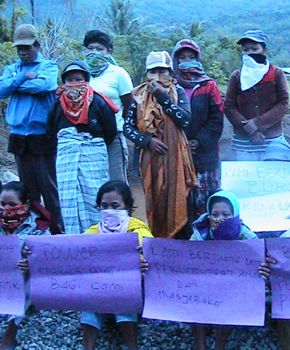A hydroelectricity mega-project is creating new problems in Poso
Lian Gogali
 |
Peura villagers protest at the site of one of the towersFian |
Before a crowd of thousands of Poso residents in late 2009, roughly three years after Christian-Muslim violence in the region had ended, Poso district head Piet Inkiriwang extolled the virtues of investment. ‘If investors come to Poso, we will all shower in money,’ he told the crowd. ‘You’ll have bucketloads.’ These buckets of money were to come from new jobs and compensation payments for land that investors would need.
Economic development is essential to rebuild Poso. But investment does not automatically lead to recovery. All over Indonesia, district heads compete to bring in new investment to their regions. Too often, a pattern of development results in which the government and large companies collude to maximise profits or for personal gain. Meanwhile, communities often have little choice but to accept unfavourable deals in the face of intimidation or to satisfy pressing short-term economic needs.
A major test-case for the benefits of investment in Poso has been the massive Sulewana hydroelectricity project. Agreed to in 2005, the project is a $650 million investment by former vice president Jusuf Kalla’s Bukaka group. Three hydropower stations on the upper reaches of the Poso River will generate around 700 megawatts when complete, making it one of the largest hydroelectricity schemes in Indonesia.
The project has polarised public opinion. On the one hand,











